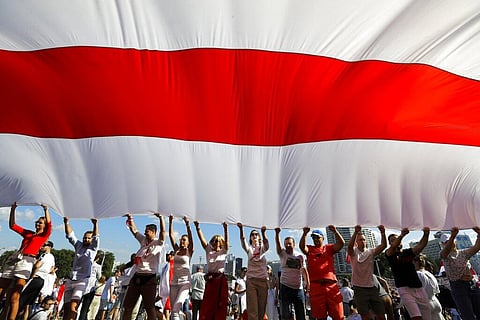

BRUSSELS: European Union leaders are putting on a show of support Wednesday for people protesting in Belarus.
Emergency talks will aim to highlight their concern about the contested presidential election and ratchet up pressure on officials linked to the security crackdown that followed.
The EU believes that the results of the Aug. 9 polls, which handed President Alexander Lukashenko his sixth term with 80% of the vote, "have been falsified," and the 27-nation bloc is preparing a list of Belarus officials who could be blacklisted from Europe over their roles.
In a letter inviting leaders to the teleconference, EU Council President Charles Michel said that "what we have witnessed in Belarus is not acceptable."
He said the "violence against peaceful protesters was shocking and has to be condemned. Those responsible must be held to account."
Belarus security forces detained almost 7,000 people and injured hundreds with rubber bullets, stun grenades and clubs in the first four days of demonstrations.
At least two protesters died.
Workers at state-controlled companies have joined strikes this week, as the unprecedented mass protests enter their 11th day and erode the authority of the man once dubbed "Europe's last dictator."
It's not entirely clear what the Europeans can do right now, but they appear determined to help maintain the momentum that began in the streets of Minsk with a show of political support, and to revive a sanctions program on Belarus that was eased four years ago as relations with Lukashenko improved.
In a video statement ahead of their virtual summit, Belarusian opposition leader Sviatlana Tsikhanouskaya called on Europe to support "the awakening of Belarus."
"I call on you not to recognize these fraudulent elections. Mr. Lukashenko has lost all the legitimacy in the eyes of our nation and the world," Tsikhanouskaya said.
On the eve of the meeting, Michel had a half-hour telephone conversation with President Vladimir Putin to share the EU's concern about election irregularities and the scale of the security crackdown, and to impress upon the Russian leader the right of the Belarus people to determine their own future.
They discussed ways to encourage talks between Lukashenko and the opposition, possibly by supporting a dialogue process fostered by the Organization for Security and Cooperation in Europe.
Judy Dempsey, Nonresident Senior Fellow at Carnegie Europe and Editor in Chief of Strategic Europe, said the emphasis from the Europeans appears to be on getting Lukashenko to start talking to an opposition whose legitimacy he has tended to question.
"Time is of the essence," she warned, if Belarusians are not to see their hopes for change hijacked.
"The EU already said it does not recognize the outcome of the presidential election. The idea of new elections would rattle Putin, whose own record on free and fair elections has been challenged, so far unsuccessfully, by protesters in Russia," Dempsey said.
The relatively small EU nation of Lithuania is playing a major role as the protests unfold by giving refuge to Tsikhanouskaya.
Its Baltic neighbors, Estonia and Latvia, are also deeply involved in diplomatic efforts, as is Poland.
Some in Europe are concerned that hitting Lukashenko and his associates too hard might drive Belarus into the arms of Russia, even though relations between Minsk and Moscow have been troubled in recent years and even more tense in the run up to the polls.
Others fear Russian intervention.
But experts tend to play down those worries, and say the people of Belarus only want to secure independence, and are not interested in deeper relations with Russia, the European Union, or in joining Moscow's nemesis, the NATO military alliance.
Belarus is not Georgia or Ukraine, where Putin fanned the flames of conflict by backing pro-Russian separatists.
Ekaterina Pierson-Lyzhina, a Brussels-based researcher into Belarus' EU foreign policy, said that recent surveys suggest around 60 per cent of people want the country to remain independent and reject any kind of union.
Smaller groups are divided up into those who support European or Russian integration.
"There are no European flags, no Russian flags. This revolution is about domestic dissatisfaction of the majority of Belarusians with their president, who has held a grip on power for 26 years," she said, and urged the EU to set up a fund for victims of the crackdown and help build a database on police crimes.